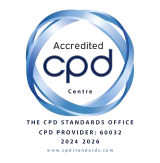

The Human Immunodeficiency Virus (HIV) impacts around 110,000 individuals in the UK (Source: nat.org.uk). This virus adversely affects immune system cells, diminishing the body's capacity to combat everyday infections. While there is no cure for HIV currently, awareness, treatments and early diagnosis enables people with the virus to live a long and healthy life.
Regular HIV training is crucial for healthcare professionals. It helps them stay up to date with the latest HIV treatment improvements, leading to better patient care and increased awareness. The world of HIV treatment is always changing, bringing new ways to improve patients' health. Keeping up with these changes is vital for best practice.
This HIV Awareness E-Learning course equips healthcare professionals with a deep understanding of crucial aspects related to HIV, such as how it is transmitted, preventive strategies, and the importance of providing comprehensive support to individuals living with HIV.

We're proud to share that all our E-learning courses are assured by City & Guilds, a global benchmark for excellence. This recognition highlights our commitment to delivering high-quality training that truly makes a difference.

Our courses support lifelong learning and professional growth, accredited by the CPD Certification Service to ensure they meet recognised standards for Continued Professional Development.
Take a closer look at our E-learning experience. Below, you’ll find screenshots from the course alongside a sample certificate you’ll receive upon completion (click to view).
Our courses are designed to be engaging, intuitive, and practical, giving you the tools and confidence to excel in your field.
If you would like to see how our E-learning platform works before purchasing, click on the 'try before you buy' button below and you can try a full length Elearning module, completely free of charge!
Try Before You Buy